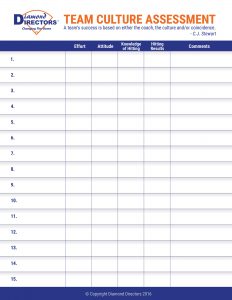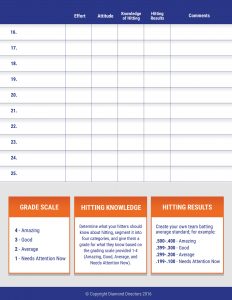What is the standard for your baseball team in the areas of effort, attitude, knowledge of hitting and hitting results?
 The reason you should find this out from your coaches is because if you and your teammates fail to meet these standards, it will cause a negative culture. And it surely will show up in your personal stats and team standings.
The reason you should find this out from your coaches is because if you and your teammates fail to meet these standards, it will cause a negative culture. And it surely will show up in your personal stats and team standings.
The question is – can effort and attitude be taught? The answer is yes. Just like the mechanics of hitting can be taught with the expectation of achieving amazing hitting results, so can attitude.
Effort
What It Is: Effort is a determined attempt. Amazing and good effort usually is lost when selfishness is present. The best way to develop the skill of effort is by getting into a habit of doing things you don’t want to do.
How to Teach It: What’s one thing you don’t enjoy doing during baseball practices and/or games with your teammates? For me, I didn’t enjoy picking up baseballs after batting practice. I always would come up with an excuse to avoid it. I was a selfish player.
Do It Now: Do that “one thing” each practice and/or game to build your effort muscles.
Attitude
What It Is: Attitude is a way of thinking or feeling about someone or something. An amazing and good attitude usually is lost when things don’t go your way.
How to Teach It: What’s one thing you hope happens for you in every baseball game? For me, it was to get at least two hits in every game. If I did, I was cool. If I didn’t, I was a jerk.
Do It Now: Ask one of your teammates to grade your attitude after each game, if you don’t achieve your one thing.
 Knowledge of Hitting
Knowledge of Hitting
What It Is: The essentials (those “must happens”) of hitting include the seven parts of the swing. You can’t repeatedly do what you don’t understand, unless you’re consistently lucky.
- Stance/Load
- Timing
- Tempo
- Tracking
- Approach
- Contact
- Extension/Finish
Amazing hitting essentials (those “must happens”) are to productive at bats as stitches are to baseballs. Productive at bats are based on four criteria:
- A minimum of six pitches per at bat, regardless of the outcome
- A walk
- Hitting the ball hard anywhere, regardless of the outcome
- Executing an offensive strategy, i.e., advancing a runner from base to base
Achieving a productive at bats 50 percent of the time leads to hits 30 percent to 50 percent of the time.
How to Teach It: Share all of the above with your hitters.
Hitting Results
What It Is: Batting average MLB, NCAA, high school and below:
MLB & NCAA
Amazing – .330+
Good – .329 – .280
Average – .279 – .230
Needs Attention Now – .229 and below
High School & below
Amazing – 500+
Good – .400 – .499
Average – .300 – .399
Needs Attention Now – .299 and below
How to Teach It: Consistently preach productive at bats as a means of getting hits. Use your practices to train your hitters on having productive at bats in games.
Do It Now: Training for productive at bats requires 3,000 reps to build a habit.
Pitch Selection x 300 reps per week at practice and/or home to improve your ability to have a productive at bat based on seeing 6 pitches per at bat and drawing walks (must become a habit)
Timing x 300 reps per week at practice and/or at home to improve your ability to have a productive at bat based on hitting the ball hard (must become a habit)
Tempo x 300 reps per week at practice and/or at home to improve your ability to have a productive at bat based on hitting the ball hard (must become a habit)
Tracking x 300 reps per week at practice and/or at home to improve your ability to have a productive at bat based on hitting the ball hard (must become a habit)
Situation hitting x 300 reps per week at practice and/or at home to improve your ability to have a productive at bat based on executing an offensive situation (must become a habit)
Remember: Intelligence trumps being smart.
For more information, visit www.diamonddirectors.com today. Also, check out our Digital Magazine.
BIO
C.J. Stewart has built a reputation as one of the leading professional hitting instructors in the country. He is a former professional baseball player in the Chicago Cubs organization and has also served as an area scout for the Cincinnati Reds. As founder and CEO of Diamond Directors Player Development, CJ has more than 12 years of player development experience and has built an impressive list of clients, including some of the top young prospects in baseball today. If your desire is to change your game for the better, C.J Stewart has a proven system of development and track record of success that can work for you.

Leave a Reply